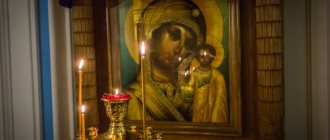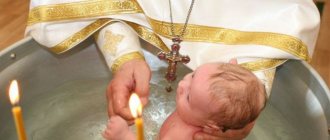What is a commemoration
In many families where the traditions of Christianity are honored, there is a special book - a commemoration book, where the names of living and deceased relatives are entered, and which should be submitted to the church for commemoration during the service. If your family still does not have such a book, the memorial can still be purchased in churches or Orthodox book stores.
A memorial is a record for posterity about the ancestors who lived on earth, which makes the memorial a book that is important for every Christian and forces them to treat it with respect. Memorials are kept clean and tidy, near household icons.
What are notes “On health” and “On repose”
A church note “On health” or “On repose” is, in essence, a one-time memorial. Such a note requires the same respect as a memorial book. It should be filled out carefully according to the established rules.
A note submitted without an image of a cross, written in sloppy, illegible handwriting, with many names, indicates a lack of understanding of the sacred importance and high purpose of recording the names of the living and deceased for their commemoration.
Meanwhile, memorials and notes, both in their appearance and in their use, can be called liturgical books: after all, the Holy Cross is depicted on them, they are brought into the altar, and read during the Divine Liturgy before the Holy Altar.
How to correctly write a note “On health” and “On repose”
- Notes must be submitted before the start of the liturgy. It is best to submit notes of remembrance in the evening or early in the morning, before the start of the service.
- When writing down the names of the living and the dead, remember them in the process of writing with a sincere desire for their good, from the bottom of your heart, trying to remember the one whose name you are writing in - this is already a prayer.
- The note must contain no more than ten names. If you want to remember many of your family and friends, send a few notes.
- Names must be written in the genitive case (answer the question “who?”).
- The names of bishops and priests are indicated first, and their rank is indicated - for example, “about the health” of Bishop Tikhon, Abbot Tikhon, Priest Yaroslav, then write your name, your family and friends. The same applies to notes “about the repose” - for example, Metropolitan John, Archpriest Michael, Alexandra, John, Anthony, Elijah, etc.
- All names must be given in church spelling (for example, George, not Yuri) and in full (for example, Alexander, Nikolai, but not Sasha, Kolya),
- The notes do not indicate surnames, patronymics, ranks and titles, or degrees of relationship.
- A child under 7 years old is referred to in the note as an infant—the baby John.
- If you want, in health notes you can mention “sick”, “warrior”, “travelling”, “prisoner” before the name. They don’t write in notes: “suffering”, “embarrassed”, “needy”, “lost”.
- In the notes “On Repose” the deceased is referred to as “newly deceased” within 40 days after death.
- It is allowed in notes “On repose” to write before the name “killed”, “warrior”, “of ever-memorable” (day of death, name day of the deceased).
- Notes for a prayer service or memorial service, which take place after the end of the liturgy, are submitted separately.
Whose names can be written in a note “about health”
In notes submitted for commemoration, the names of only those who have been baptized in the Orthodox Church are written.
The concept of “health” includes not only the health and physical condition of a person, but also his spiritual condition and material well-being. And if we pray for the health of a person who has done a lot of evil, this does not mean that we are praying that he will remain in the same state in the future - no, we pray to God that He will change his intentions and internal disorder, made sure that our ill-wisher or even enemy began to be in harmony with God, with the Church, with others.
This note should include everyone to whom we wish health, salvation and prosperity. The Word of God teaches that everyone needs to pray not only for themselves, but also for others: “pray for one another.” The Church is built on this common prayer for each other.
Now the health note is filled out in the following order:
- name of the Patriarch,
- name of the Archpastor,
- the name of your spiritual father, the priest who instructs you, cares about the salvation of your soul, prays to the Lord for you.
- parents' names,
- own name,
- names of your family members,
- names of loved ones and relatives,
- names of benefactors,
- names of envious people, offenders, enemies.
Why in this order?
- In Imperial Russia, all prayer services began with the name of the Sovereign Emperor, on whose “health” the fate of not only Russia, but also every family, every Orthodox Christian depended. Now we must first write the name of our Patriarch, and after him - the Archpastor, the Most Reverend Bishop, appointed by God as a spiritual ruler, caring for and offering prayers and sacrifices to the Lord for the flock entrusted to him.
- Then the name of your spiritual father, the priest who instructs you, takes care of the salvation of your soul, prays to the Lord for you: “Remember your teachers.”
- Then write the names of your parents, your name, the names of your family members, loved ones and relatives. Everyone should pray for the health and well-being of their family: “If anyone does not take care of his own, and especially his family, he has renounced the faith and is worse than an infidel.”
- Everyone should pray for the health and well-being of their family: “If anyone does not take care of his own, and especially his family, he has renounced the faith and is worse than an infidel.”
- For your family and relatives, write down the names of your benefactors. If they did good to you, then you should wish and pray for good and blessings from the Lord for them, so as not to remain in debt to them.
- Finally, if you have an ill-wisher, an offender, an envious person or even an enemy, write down his name for prayerful remembrance, according to the commandment of the Lord: (love your enemies, bless those who curse you, do good to those who hate you and pray for those who offend you and persecute you."
- Prayer for enemies, for those at war, is a great force for ending hostility and establishing peace. The Savior himself prayed for his enemies. There are many known cases when one of the warring parties wrote the name of his ill-wisher in the health note next to his name - and the hostility stopped, the former enemy became a well-wisher.
Expectant mothers in the church pray to the icon of the Mother of God “Non-idle”
Every expectant mother in the church knows who to turn to and light a candle for the birth of a child.
There is an icon of the Mother of God “Non-idle”, to which all women who want to give birth and bear fruit safely pray.
There are a lot of such icons of the Mother of God. The most famous one looks like this:
There are revered lists of this “Non-idle” icon in Orsk in the convent in the name of the Iveron Icon of the Mother of God, as well as in the Kortskhelsky monastery in honor of the Iveron Icon of the Mother of God
This icon is an illustration of the story of the Holy Gospel about how the holy righteous Joseph learned that the Virgin was betrothed to him
“has with child the Holy Spirit” and wanted to secretly release Her
(Matt. 1:18-19)
The Mother of God stands with her right hand raised to her head, wiping away tears, and with her left hand she points out to Joseph that “she does not know her husband,” she is a Virgin.
Righteous Joseph - according to the New Testament, the betrothed husband of the Most Holy Theotokos. Here he is with the baby Jesus Christ in his arms
Not only pregnant women pray to the icon, but also those women who cannot become pregnant or have children.
There are also prayers that every woman can read in front of the icon every day.
The prayerful sigh of an idle woman whom God blessed with the fruit of her womb:
Almighty, miracle-working, merciful God, Creator and Preserver of heaven and earth and all creatures, Who Himself pronounced a blessing on all Christian spouses: grow and multiply!
And one more thing: this is the inheritance from the Lord: children, the fruit of the womb, a reward from Him.
I thank You that You made me partaker of this blessing and Your gift in my married state,
and I pray to You, deign to bless the fruit of the womb that You have given me, to bless and bless it with Your Holy Spirit,
accept Your children into the number of your beloved ones and make them partakers of St. sacraments of the church of Your beloved Son, my Lord Jesus Christ,
so that through this he may be sanctified and cleansed from the hereditary sin in which he was conceived.
Lord God! I and the fruit of my womb are children of wrath by nature, but You, beloved Father, have mercy on us,
and sprinkle the fruit of my womb with hyssop, that it may be clean; wash it, and make it whiter than snow. Strengthen and preserve him in the womb until the hour when he must be born.
This fruit of my womb was not hidden from you when it was formed in the womb,
Your hands formed him, You gave him life and breath, and Your supervision was to preserve them.
Keep me from fear and fright and from evil spirits who would like to damage and destroy the work of Your hands.
Grant him a rational soul, and cause his body to grow healthy and undefiled, with whole, healthy members, and when the time and hour comes, allow me by Your mercy.
Grant me strength and strength for birth, make him happy with Your almighty help and ease my suffering,
because these are Your work, the miraculous power of Your omnipotence, the work of Your mercy and mercy.
Remember the word You spoke: You brought me out of the womb; I am committed to Aa. from birth; from my mother's womb You are my God; You laid me to rest at my mother's breast.
You are God, knowing and seeing the needs of all people; You said: when a woman gives birth, she suffers sorrow, because her hour has come. God!
For the sake of this heartfelt compassion of Yours and for the sake of Your heart filled with pity, I pray to You, deign to ease my sorrow, which You foresaw, and bring into the world the fruit of my womb, with a healthy, living body and intact, well-formed members.
I entrust it to You, into Your almighty, fatherly hands, into Your mercy and mercy, and I place it, Lord Jesus Christ, in Your holy embrace, may you bless this fruit of my womb, as You blessed the children brought to You when you spoke : “Let the children come and do not hinder them from coming to Me, for such is the Kingdom of Heaven.”
Savior! So I offer You this fruit of my womb; lay Your gracious hand on him. Bless him with the finger of Your Holy Spirit and grace him, when he comes into this world, with holy, blessed baptism;
sanctify and renew him to eternal life through regeneration, make him a new creature, wash and cleanse him with Your blood, make him a member of Your Holy Body and Your holy Christian Church, so that Your praise may be uttered from his lips,
and he was and forever remained a child and heir of eternal life, through Thy holy, bitter suffering and Thy death and Thy holy name, Jesus Christ. Amen.
Prayer of non-idle women for a successful resolution:
Oh, Most Glorious Mother of God, have mercy on me, Your servant, and come to my aid during my illnesses and dangers, with which all poor daughters of Eve give birth to children.
Remember, O Blessed One among women, with what joy and love You went hastily to the mountainous country to visit Your relative Elizabeth during her pregnancy, and what a wonderful effect Your gracious visit had on both mother and baby.
And according to Your inexhaustible mercy, grant also to me, Your humble servant, to be freed from the burden safely; grant me this grace,
so that the child, now resting under my heart, having come to his senses, with a joyful leap,
like the holy baby John, they worshiped the Divine Lord Savior, who, out of love for us sinners, did not disdain to become a baby Himself.
May the unspeakable joy with which Your virgin heart was filled at the sight of Your newborn Son and Lord, sweeten the sorrow that awaits me amid the pains of birth.
May the life of the world, my Savior, born of You, save me from death, which cuts off the lives of many mothers at the hour of resolution, and may the fruit of my womb be numbered among the elect of God. Hear, O Most Holy Queen of Heaven, my humble prayer and look upon me, a poor sinner, with the eye of Your grace; do not shame my trust in Your great mercy and overshadow me.
Helper of Christians, Healer of illnesses, may I also be honored to experience for myself that You are the Mother of mercy, and may I always glorify Your grace, which has never rejected the prayers of the poor and delivers all those who call on You in times of sorrow and illness. Amen
Whose names can be written in a note “about repose”
The second note given in the church is “On Repose.” Names should be written in it:
- deceased relatives,
- deceased acquaintances,
- deceased teachers and mentors,
- deceased well-wishers who did good to you,
- all the deceased who are dear to you.
Just as we pray for the living, so we must pray for the dead - and not only for our closest relatives, but also for our entire family, for everyone who did good to us in earthly life, helped, taught.
The dead, although they have departed from us, although they remain in the flesh in the earth, and in soul with the Lord, have not disappeared, they continue to live a spiritual life invisible to us in the eyes of God. We believe that our deceased relatives, and we often do not know the names of many of them, pray for us, their descendants.
Our unity and communication with the dead is especially felt during fervent prayer for them. It produces an extremely deep effect and impression on the soul of the person praying, proving the real communication of the soul of the person praying with the souls of those for whom the prayer is offered.
Marriage is a stairway to God
It should be remembered that childbirth is an important, but not the dominant function of marriage. Being in a marital union, a man and a woman are primarily called to diligent spiritual improvement. Its steps lead to the highest goal - unity with God, salvation in Christ.
The Apostle Paul taught that love is the main virtue, without which all other spiritual achievements are meaningless (1 Cor. 13:1). The Holy Church understands marriage as an ideal school of true sacrificial love. Archpriest Gleb Kaleda notes:
“In marriage and love, a person transfers the center of interests and worldview from himself to another, gets rid of his own egoism and egocentrism, immerses himself in life, entering it through another person. To some extent, he begins to see the world through the eyes of two. The love we receive from our spouse and children gives us fullness of life, makes us wiser and richer.”
Holy Scripture likens marriage to the union of Christ and the Church (Eph. 5:22-25). Just as the Church honors the Lord, so a wife should honor her husband. She was created as a faithful assistant, a friend for him. Archpriest Dmitry Sokolov notes:
“A wife should, prompted by love, work for his good and especially for the eternal good... Not only to give a man comfort in this life, but also to help him achieve eternal life.”
And the husband is called to love and protect his wife, like Christ, who ascended to the cross for the sake of the Church. The attitude towards a spouse should be prudent and reverent, as if towards a fragile vessel (1 Pet. 3:7). When spouses work on themselves, cultivate the virtue of love, visit church together, participate in prayer and the Sacraments, then, according to the Monk Paisius the Holy Mountain, they inextricably merge into one and are sanctified by the presence of the Third - the Sweetest Christ (“Words”, volume 4).
Whose names cannot be written in notes “On health” and “On repose”
Who should not be mentioned in notes?
The Church does not commemorate the following people:
- suicides;
- not baptized in the Orthodox faith (atheists, heterodox, non-Orthodox);
- deceased, canonized saints. The reason is simple: being at the Throne of God, they are the ones who pray for us; - convinced atheists and fighters against God, even if they were baptized into Orthodoxy. You should not submit notes about them, you should pray for them at home.
Who to pray for a safe birth
- Lord God
Most often, expectant mothers ask for help from the Most Holy Theotokos in front of Her icons:
- "Assistant in childbirth";
- "Blessed Womb";
- "Mammal"
- “The word became flesh”;
- "Fedorovskaya".
And they also turn to the saints:
- righteous Joachim and Anna;
- righteous Zechariah and Elizabeth;
- Great Martyr Catherine;
- Great Martyr Anastasia the Pattern Maker;
- Great Martyr and Healer Panteleimon;
- Venerable David of Gareji;
- Venerable Stylian of Paphlagonia;
- Rev. Alexander of Svirsky;
- Blessed Matrona of Moscow;
- Saint Luke of Crimea;
- to all the saints.
Ordered note in church (mass)
In addition to ordinary notes about health and repose, Orthodox Christians accept custom notes. A customized mass for health with a prayer differs from a regular commemoration for health in that, in addition to removing a particle from the prosphora (which happens during a regular commemoration), the deacon publicly reads the names of those commemorated in the litanies, and then these names are repeated by the priest before the altar.
But even this is not the end of the commemoration according to the ordered note - after the end of the liturgy, a prayer is offered for them at a prayer service. The same thing happens at a custom-made mass of repose with a memorial service - and here, after removing the particles with the names of the deceased, the deacon publicly pronounces their names at the litany, then the names are repeated in front of the altar by the clergyman, and then the deceased are remembered at the memorial service, which takes place after the end of the liturgy .
Prayer to the Most Holy Theotokos in front of Her icon “Healer”
Accept, O All-Blessed and All-Powerful Lady Theotokos the Virgin, these prayers, now offered to You with tears from us, Your unworthy servants, who send up the singing of Your celibate image with tenderness, as if You yourself are here and heed our prayer. For every request you fulfill, you alleviate sorrows, you grant health to the weak, you heal the weakened and sick, you drive away demons from demons, you deliver the offended from insults, you cleanse lepers and you are kind to little children; Moreover, O Lady, Lady Theotokos, you free us from bonds and prisons and heal all manifold passions: for all things are possible through Your intercession to Your Son, Christ our God. Oh, All-Singing Mother, Most Holy Theotokos! Do not cease to pray for us, Your unworthy servants, who glorify You and honor You, and who worship Your Most Pure Image with tenderness, and who have irrevocable hope and undoubted faith in You, the Ever-Virgin, Most Glorious and Immaculate, now and ever and unto the ages of ages. Amen.
Sorokoust
Sorokoust is a prayer service that is performed by the Church daily for forty days. Every day during this period, particles are removed from the prosphora. Sorokousts are ordered not only for repose, but also for health, especially for seriously ill people.
The forty-day commemoration includes both church commemoration, performed during the liturgy, and private home commemoration. Church commemoration takes place during the proskomedia; For a deceased Christian, the clergyman takes out a piece of prosphora, while saying: “Remember, Lord, (the name we wrote is indicated).”
Private commemoration in the first forty days after death consists of reading the Psalter and is usually performed by relatives, people close to the deceased, or a specially hired Christian.
Prayer to the Most Holy Theotokos before Her Feodorovskaya Icon
To whom will I call, Lady, to whom will I resort in my sorrow; to whom will I bring my tears and sighs, if not to You, Queen of Heaven and earth: who will pluck me from the mire of sins and iniquities, if not You, O Mother of the Belly, Intercessor and Refuge of the human race. Hear my groaning, comfort me and have mercy in my sorrow, protect me in troubles and misfortunes, deliver me from anger and sorrow, and all sorts of ailments and illnesses, from visible and invisible enemies, pacify the enmity of those who suffer me, so that I will be delivered from slander and human malice ; Likewise, free me from your flesh’s vile customs. Cover me under the canopy of Your mercy, so that I may find peace and joy and cleansing from sins. I commend myself to your Motherly intercession; give me Mother and hope, protection, and help, and intercession, joy and consolation, and a quick Helper in everything. Oh, wonderful Lady! Everyone flows to You, without Your all-powerful help does not leave; For this reason, even though I am unworthy, I come running to You, so that I may be delivered from sudden and cruel death, gnashing of teeth and eternal torment. I am worthy to receive the Kingdom of Heaven and to You in the tenderness of my heart the river: Rejoice, Mother of God, our zealous Representative and Intercessor, forever and ever. Amen.
Note for prayer service
A prayer service is a special divine service in which they ask the Lord, the Mother of God, and the saints to send mercy or thank God for receiving benefits.
In the church, prayer services are performed before and after the liturgy, as well as after Matins and Vespers. Public prayer services are performed on temple holidays, on New Year's, before the start of the youth's teaching, during natural disasters, during invasions of foreigners, during epidemics, during rainlessness, etc. Other prayer services belong to private worship and are performed at the requests and needs of individual believers. Often during these prayers there is a small blessing of water.
The note for the prayer service begins with an indication of which saint the prayer service is being offered, whether it is for health or repose. Then the names of those for whom the prayer song will be offered are listed.
When you submit a note for the prayer service, tell the minister whether you are ordering a water-blessing prayer service - in this case, a small blessing of water is performed, which is then distributed to the believers - or a regular one, without the blessing of water.
You can order commemoration of the living or deceased for a month, for six months, for a year. Some churches and monasteries accept notes for eternal remembrance.
When and how often do you need to submit notes “about health” and “about repose”
The prayer of the Church and the Most Holy Sacrifice attract the mercy of the Lord to us, purifying and saving us. We always, both during life and after death, need God's mercy towards us. Therefore, it is necessary to be rewarded with the prayers of the Church and the sacrifice of the Holy Gifts for us or our loved ones, living and deceased, as often as possible, and always on those days that have special meaning:
- on your birthday,
- baptism day
- Name day of both your own and your family members.
Honoring the memory of the saint whose name we bear, we thereby call on our patron to pray and intercede before God, because, as the Holy Scripture says, the intense prayer of the righteous can do much.
It is imperative to submit a note of remembrance on your child’s birthdays and baptisms. Mothers must carefully monitor this, because caring for the child is their sacred duty.
Whether sin attracts us to itself, whether some passion takes possession of us, whether the devil tempts us, whether despair or inconsolable sorrow befalls us, whether trouble, need, illness have visited us - in such cases, the prayer of the Church with the offering of the Bloodless Sacrifice serves as the surest means of deliverance, strengthening and consolation.
An idle woman: 2 prayers to the Mother of God for the successful bearing of a fetus
Download this article
Not an idle woman - this is what in Russia they called a woman who carried a child under her heart, and also meant that she was not idle.
A woman was always looked at as the guardian of a new life; they tried to surround her with care and warmth. The term itself meant that a woman's pregnancy was seen as a matter, and even more so, a service to society and the church.
The Holy Bible also speaks about this:
“A woman... will be saved through childbearing if she continues in faith and love and in holiness with chastity”
(1 Tim. 2:15)
Even a pregnant non-working woman, due to her position, was still considered working. After all, carrying a healthy, strong baby is not so easy.









